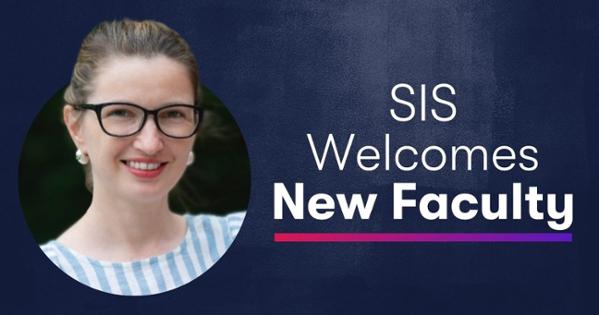American University
International
SIS Welcomes Polina Beliakova

This fall, we are thrilled to welcome our new faculty members who bring fresh perspectives and expertise into the classroom. Among our newest faculty members is Polina Beliakova, who joins the Department of Foreign Policy & Global Security. Beliakova received her PhD in international relations from the Fletcher School at Tufts University, and most recently completed a postdoctoral research fellowship at the MIT Security Studies Program, where her work addressed Russian foreign and security policy.
- What are your main research areas?
- I study how governments' relations with their militaries affect international security. This includes the decisions to use force, pursue negotiations, provide military aid, or deploy the military domestically. My regional expertise covers Ukraine, where I am from; Russia; Israel; and the United States.
- Your research methodology is quite distinctive, allowing you to conduct interviews and fieldwork as a native Ukrainian and Russian speaker. How has this insider-outsider perspective shaped your scholarship, and what advantages does it give you as a researcher?
- My command of multiple languages, especially Ukrainian, helps me collect unique data about the complex relations between the government, the military, and the civilian populations. For instance, for my book project, Know Thy Military: How Governmental Policies Weaken Civilian Control, I interviewed Ukrainian veterans, soldiers, commanders, and government officials who would not have talked to me in any other language except our native Ukrainian. In contrast, despite having native Russian proficiency, I definitely felt like an outsider during my fieldwork in Moscow. For instance, the fact that I was coming from a US university made some archivists suspicious of my requests, even when they were limited to public-facing information, such as the advertising materials of the 1996 presidential campaign. Nevertheless, my knowledge of the Russian language and culture helps me work with the archival documents, memoirs, and diaries to better interpret the context in which these sources were produced.
- In my ongoing research project about US security assistance to Ukraine before Russia's full-scale invasion, I also conduct elite interviews in Ukrainian and English, which helps me broaden the perspective on how civil-military relations affected aid provision in this crucial period for Ukrainian and European security.
- What class are you teaching at SIS this year? Why are these topics important for SIS students to study?
- In the fall semester I am teaching about US-Russia relations after the end of the Cold War. As students of my class will learn soon, I question the statement that Russia is "a riddle wrapped in a mystery inside an enigma." I invite my students to reflect on the long-lasting differences between the Russian and American views on international relations.
- Specifically, Russia and the United States have vastly different outlooks on history, dissimilar geographic endowments, and divergent views on what it means to be a great power. I show my students how these entrenched discrepancies make Russia unnecessarily mysterious in the eyes of the Western observers. The goal of this class is to teach my students to account for these differences in their analyses and demystify the unexpected turns in US-Russia relations.
- This class is especially important today in light of Russia's invasion of Ukraine, possible nuclear tensions, and discussions about European security. In addition, students in my class will apply their knowledge about US-Russia relations to AI-generated materials—an important skill that will prepare them for new challenges at work, in research, and everyday life.
- What are you looking forward to most about joining the SIS community?
- I know that the SIS community attracts passionate, smart, and competent students and scholars, each driven by different challenges of today's politics. I am looking forward to meeting my students and seeing how my expertise in civil-military relations and US-Russian relations can support their career pursuits. I am equally excited to learn from my colleagues and contribute to research, teaching, and learning at SIS.